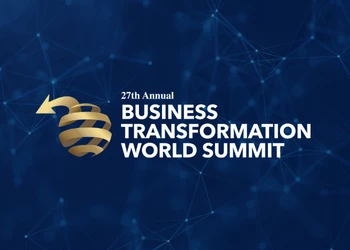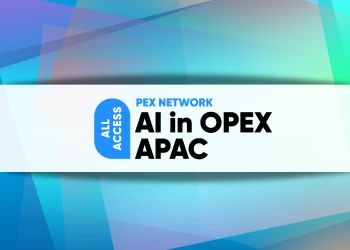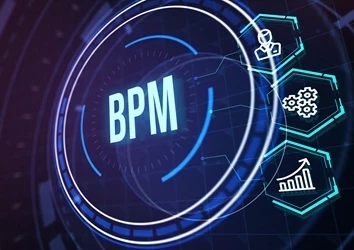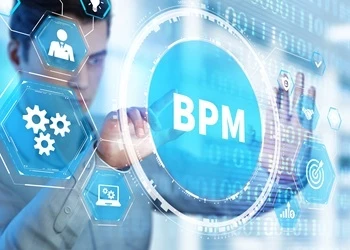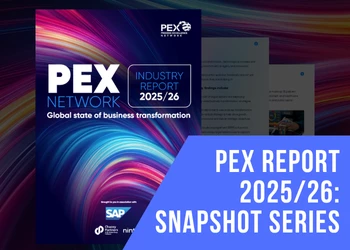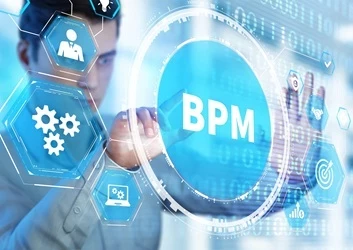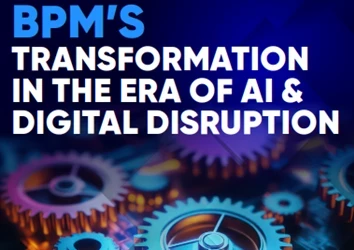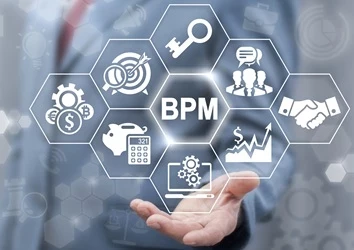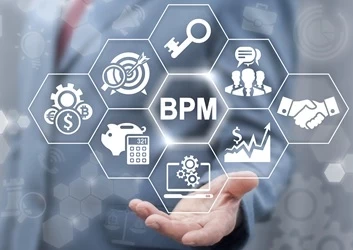Are your processes ready for a software defined future? Interview with K2’s Dennis Parker (transcript)
Add bookmarkAdvances in computing technology are driving rapid changes in every industry from retail to manufacturing, banking and beyond. But now, even the hardware that used to keep the lights on is being transformed into software – running instead in virtual environments – and IT has no longer become the barrier to process automation that it once was.
Is it time to look at how to better bring process and technology together? Interview with K2's SVP EMEA, Dennis Parker.
Editor’s note: this is a transcript of a recent podcast interview and has been edited for readability. Listen to the original podcast here.
PEX Network: Do you agree that rapid change and rapid results is fast becoming the mantra for companies, both within Europe and even beyond?
Dennis Parker: With our UK customers and with European customers, we are seeing this as a theme. The banking sector, in particular, is in the spotlight at the moment, for instance. Those organizations that are not embracing change are becoming severely challenged. It’s literally destroying them, based on the fact that they haven’t adapted to change.
Looking at the opposite extreme, we see new companies emerging that are focused on process, on customer service excellence and on the rapid ability to adapt to customer situations. They’re also embracing technology. We’re seeing those customers thrive in the same industries.
There is a cauldron of pressures coming to bear on companies that certainly seems to be driving this agenda of rapid change, rapid results.
PEX Network: What do you think is the reason for some of these coming to the fore at the moment?
Dennis Parker: A lot of companies, both in the private sector and within government, are being driven by increasing regulation. For instance, in areas such as food standards there have been changes within the food supply chain resulting in increased regulation. Regulation is most certainly driving process change and forcing people to adapt.
But I think that’s only one side of the equation and I’d hate to be almost in an industry where demand is driven only by regulation and litigation compliance. They are, at the end of the day, fairly mundane agenda items.
The more exciting agenda items are looking at how to increase value to the business. There we see areas which are founded in innovation. Organizations start focusing on the customer, focusing on the customer journey, thinking about how they can improve customer service and increased customer expectations, driven by innovative use of technology.
PEX Network: How do you see this affecting the ways that companies both think about and approach process excellence and business transformation?
Dennis Parker: We’re seeing new companies entering the space. In some traditional industries - finance and insurance come to mind, for instance – more companies are coming to market and thinking about process, customers and innovation from the ground up. So we’re seeing a desire for innovation within those groups driven by the need to differentiate in the market.
If you’re coming into an established market it’s getting more and more difficult to compete based on price or by a slim margin, for instance. Customers are less interested in these attributes alone. These days we see customers adopting technology and looking for better service levels. They’re no longer willing to be serviced by a monolithic organization where you have to sit on their call centre lines typically for an hour to get simple things done like a change of address.
Thus, we’re seeing a new market segment emerging with companies who understand that we need to re-think this. If we can apply a combination of process and technology to drive a better customer experience and better service, then that is a better outcome for all concerned.
We’ve had several conversations in the past year about customers that have implemented innovation centres. This is something new for us, and it’s really refreshing to see. We’re seeing a combination of business and technology groups reach out to us and say: We’ve got a mandate from the business to think about how we can be more innovative in the way that we service customers. How do we apply technology to improve our process, drive a better service for our customers, and really drive this concept of improved customer service and value?
PEX Network: It almost sounds like it’s innovation in both process and technology to drive that customer experience?
Dennis Parker: Absolutely. Things have changed. People coming into the market are fundamentally used to the internet and fundamentally used to mobile devices. So they want to see those technologies as a service channel.
We all know that if you’re dealing with some of the traditional call centres, they’re much more adjusted to dealing with people on the telephone. In some cases, even worse, they’re going back to written communication as a way of priming customer service. That’s just not reflective of the reality that’s going on from a technology advancement point of view, and I think that issue is going to become bigger and bigger.
PEX Network: As things change and evolve in terms of the types of things that companies are required to do just to stay competitive, how does that impact the skills and business capabilities that are required? For instance, what do you see as some of those new skills and capabilities that will be required to lead more transformational change and some of these new initiatives?
Dennis Parker: There are some studies being published at the moment which I think have a somewhat negative sentiment about how automation will start removing jobs from the market. If we take things like drivers and technologies like driverless cars or aircraft advancement where in the last month of an aircraft test flight that was done on a monitored pilot basis. It was completely automated.
There is certainly evidence that technology is transforming and introducing real pressure that will require us to think about skills in a different way. You need to think about whether that’s a good thing or a bad thing.
If you go back in time and look at this, an interesting example is the introduction of mechanized cotton mills in the 1700s. Initially those cotton mills were destroyed by gangs of workers who were rioting over the introduction of mechanization and automation into those industries.
But ultimately, when we look back, two things happen. The first is that the government stepped in and stopped the riots. But, secondly, if we draw the timeline forward from that, we can actually see that, ultimately, automation was a benefit.
There’s a long philosophical debate behind whether automation is beneficial, but in terms of job skill and in terms of more people being employed into higher value jobs, lower unemployment and higher standards of living, ultimately automation led to increased job skills and increased job spectrum.
We think that there’s an opportunity for that again with technology. Technology will open up a whole new raft of changes. We see what’s going on with 3D printing as an example, where the concept of moving to wholesale manufacturing by monolithic organizations into more mini manufacturing is going to become quite interesting.
But there are many, many more areas. From there, for instance, you can go to virtual reality technologies that I think will force change and transformation, but into jobs that may be more interesting and higher up the value chain.
That’s a very philosophical look at it. I want to spend a couple of minutes thinking about how that becomes practical in terms of process and software. Some of the things that we’ve started to see emerge in this past year is this concept of "software defined organizations". It’s really a very, very interesting thing to take a look at.
If we look at core computing, for instance, we see that physical hardware is being redefined by essentially virtual machines, and therefore core computing is definitely becoming software defined.
Now, that is rapidly expanding out. The next thing that we can see are the networks. Networks are becoming virtualized and therefore they’re becoming very software defined. What we see emerging is a trend of many core IT services moving rapidly to this software defined architecture. For example, standards are emerging for infrastructure as code. That may be quite academic, but it certainly lays foundation for completely new possibilities on the way that companies will think about how they implement core infrastructure and, importantly, how they scale that core infrastructure.
So, again, why is that interesting? Well, we think that’s interesting because we think that some forward thinking companies are beginning to realise that actually your entire organization, actually, can become software defined.
If we look at the reality of computing architectures, though, what we have are very silo’d, transactional, monolithic software architectures, that essentially define how the business must run. But we think, going forward, that software really becomes the way that you can define and differentiate yourself.
And the reason why that’s going to become important is because it’s a reflection of all the things we’ve been talking about. It’s this ability to rapidly reflect your organization’s process needs into software and drive and improve customer experience using that software.
We’ve recently been talking about this concept of disposal applications, which is an interesting term. It evokes different emotions in different people as you say that for the first time. It’s not something that sits comfortably on the tongue when you think about disposable software applications.
But the reason the concept is important is because, for the first time, what we see is that the cost and the speed of implementing software to go and address a particular customer need has reached a point where we can start to think about software in a new way. If we bring that all the way back to your question about: How is this transformational? And what are the different skills required? I think it allows us to conclude that software’s reaching a point that, when you’re sitting inside an organization and you think up a process that is going to add value to a customer interaction.
In the past the cost of actually implementing a process and automating it was probably several years, and therefore when you combined the time and the cost of implementing that improved process, it just became impractical in many cases, and you tended to fall back on the transactional monolithic approach. I think the new architectures are more interesting in that the cost and the time to implement some of those ideas is rapidly diminishing, and therefore we see the possibility of really the concept of this disposable app.
This rapid ability for customers to define their processes, automate them, and reflect them using software is a very, very interesting and exciting way to think about how the future might emerge in the space. So, yes, I guess that’s been a fairly lengthy discussion about some of the core principles in what we see, but we are very, very excited about what we see and what we actually see reflected in some forward thinking customers.
PEX Network: I think that’s really interesting, because I could also see the impact being that process, technology and business groups need to work a lot more closely together as they deliver this rapid change. You can’t keep sitting apart in your separate groups, because you just don’t have time. You need much more close collaboration?
Dennis Parker: Absolutely. I think there must also be frustration within existing process groups, because it’s evident to me talking to some of those people they have great ideas about how, if they could implement process and truly automate it, it would be fundamentally transformational to the business. On the IT side of things, and we sit there, we’re vendors and we’re in the supply chain of that space.
IT just has not been able to deliver to those organizations. When people come up with great ideas on how to transform the business, cost and time become the biggest challenges to really moving those agendas forward. So the closer we can get those organizations together the better, and the better that software can start to service that need, the more rapid the adoption of some of those ideas is going to be.
PEX Network: For my final question, I wanted to pick up on something that you’ve referenced already in that last answer, which was the recent research that’s come out, looking at process automation. One study in particular published by Oxford University predicted that about 47% of existing job categories could be automated in the next decade or so as big data enables more complex tasks to become more automatable. Yet this seems in conflict with the trend for focusing on customer satisfaction. Do you think that process automation and improved customer satisfaction can really go together?
Dennis Parker: I think it talks to many of the principles of the things that we’ve been discussing, and I really would want to go back to that concept of the early stages of industrialization. That particular study references the issue of the cotton mills in Britain in the early 1700s, and how they were destroyed because of the anger of people who were working in a manual way at that time. And one has to look forward past that point, because at that moment of change, certainly technology advancement can feel very threatening.
But, ultimately, if we go forward, we have to conclude that more people were lifted into a higher standard of living and employment. We were able to put people into higher value jobs. Certainly there’s probably a finite limit to how much you can automate before you see real impact, but my personal view on this is that certainly some of these things like automatic ticketing, driverless trains, driverless cars, they are certainly going to impact some of these jobs.
But I’m also very positive about the fact that technology will also introduce whole new rafts of employment possibilities. One exciting area is this concept of mini manufacturing. Today, as we’ve said, manufacturing is largely controlled by very large manufacturing facilities that have the kind of infrastructure to do that. In the future, we look at technologies such as nanotechnologies that are coming to drive different ways of mini manufacturing along with some of the more popular ones like 3D printing.
We’re already starting to see strong signs that there are new employment centres being created by some of this new technology. So, for me, I think the view has to be that we have to look at technology as something that will introduce new capabilities and better capabilities, not as something that is threatening our status quo. Because I think that actually is a kind of mental problem.
If we have that attitude of automation being something that is threatening to us, then it obviously becomes an obstacle for change. Personally the way we want to look at it is that we think it’s positive and it will lift people into doing more meaningful things.
[inlinead]


